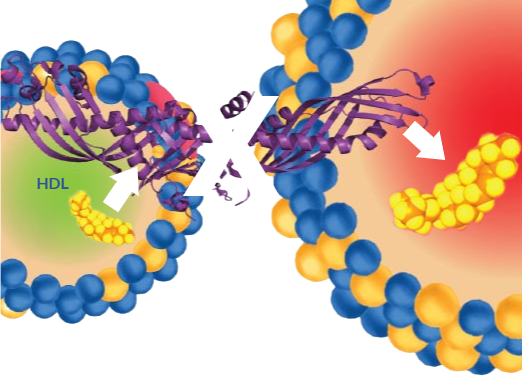

Other Lipid-Related
Conditions
Research suggests that lower cholesteryl ester transfer protein (CETP) activity is
associated with a decreased risk for other cardiometabolic and neurodegenerative
diseases, including type 2 diabetes and Alzheimer’s disease.1,2
NewAmsterdam Pharma is currently investigating CETP inhibition as a potential
treatment for these diseases.
Jump to:
Alzheimer’s Disease | Type 2 Diabetes
CETP Inhibition and Alzheimer’s Disease
Elevated cholesterol levels have been linked to an increased risk of Alzheimer’s disease later in life.3 The key link between lipid dysregulation and Alzheimer’s disease is the status of apolipoprotein E (ApoE), the key lipoprotein for cholesterol transport in the brain.4
The APOE4 variant is associated with less efficient cholesterol transport compared to APOE2 and APOE3 variants. APOE4 carriers have increased risk for both cardiovascular disease and Alzheimer’s disease.3,5-6
Genetic studies suggest that CETP loss-of-function variants may be associated with reduced dementia risk, particularly in APOE4 carriers.2 A Mendelian randomization analysis demonstrated that lower CETP activity is associated with higher total brain volume, decreased risk of Lewy body dementia, and reduced risk of Parkinson’s disease-associated dementia.2
We are conducting research on the potential for CETP inhibition to be a viable treatment strategy for dementia.



~25%
of people carry at least one copy of the APOE4 variant7
~60%
of patients with Alzheimer’s disease carry a copy of the APOE4 variant8
22%-45%
increased risk of cardiovascular disease in APOE4 carriers9

CETP Inhibition and Type 2 Diabetes
Statin therapy, the most widely prescribed lipid-lowering treatment, has been associated with increased diabetes risk in multiple studies. In a retrospective cohort study of 83,022 matched pairs of patients with diabetes, statin use was associated with a 37% increased relative risk of diabetes progression.10
Data suggest that CETP inhibition could be a promising approach to improve beta cell function in type 2 diabetes by reducing free cholesterol accumulation in ß-cell islets, which may contribute to ß-cell dysfunction.11
In meta-analysis of four large randomized controlled trials, CETP inhibitors reduced new-onset diabetes risk in patients with cardiovascular disease or at high cardiovascular risk.1 Additionally, individual trials have also shown improvements in glycemic parameters, including reduced HbA1c levels in patients with existing diabetes.12
NewAmsterdam Pharma is conducting research to evaluate the effects of CETP inhibition in people with type 2 diabetes.

Our Clinical Programs
Learn more about obicetrapib, our investigational novel CETP inhibitor
1. Dangas K, Navar AM, Kastelein JJP. The effect of CETP inhibitors on new-onset diabetes: a systematic review and meta-analysis. Eur Heart J Cardiovasc Pharmacother. 2022;8(6):622-632. doi:10.1093/ehjcvp/pvac025 2. Schmidt AF, Davidson MH, Ditmarsch M, Kastelein JJ, Finan C. Lower activity of cholesteryl ester transfer protein (CETP) and the risk of dementia: a Mendelian randomization analysis. Alzheimers Res Ther. 2024;16(1):228. Published 2024 Oct 16. doi:10.1186/s13195-024-01594-6 3. Feringa FM, van der Kant R. Cholesterol and Alzheimer’s Disease; From Risk Genes to Pathological Effects. Front Aging Neurosci. 2021;13:690372. Published 2021 Jun 24. doi:10.3389/fnagi.2021.690372 4. Mahley RW. Central Nervous System Lipoproteins: ApoE and Regulation of Cholesterol Metabolism. Arterioscler Thromb Vasc Biol. 2016;36(7):1305-1315. doi:10.1161/ATVBAHA.116.307023 5. Abondio P, Sazzini M, Garagnani P, et al. The genetic variability of APOE in different human populations and its implications for longevity. Genes (Basel). 2019;10(3):222. doi:10.3390/genes10030222 6. Jeong W, Lee H, Cho S, Seo J. ApoE4-induced cholesterol dysregulation and its brain cell type-specific implications in the pathogenesis of Alzheimer’s disease. Mol Cells. 2019;42(11):739-746. doi:10.14348/molcells.2019.0200 7. Gharbi-Meliani A, Dugravot A, Sabia S, et al. The association of APOE ε4 with cognitive function over the adult life course and incidence of dementia: 20 years follow-up of the Whitehall II study. Alzheimers Res Ther. 2021;13(1):5. Published 2021 Jan 4. doi:10.1186/s13195-020-00740-0. 8. Ward A, Crean S, Mercaldi CJ, et al. Prevalence of apolipoprotein E4 genotype and homozygotes (APOE e4/4) among patients diagnosed with Alzheimer’s disease: a systematic review and meta-analysis. Neuroepidemiology. 2012;38(1):1-17. doi:10.1159/000334607 9. Xu M, Zhao J, Zhang Y, Ma X, Dai Q, Zhi H, Wang B, Wang L. Apolipoprotein E gene variants and risk of coronary heart disease: a meta-analysis. Biomed Res Int. 2016;2016:3912175. doi:10.1155/2016/3912175. 10. Mansi IA, Chansard M, Lingvay I, Zhang S, Halm EA, Alvarez CA. Association of statin therapy initiation with diabetes progression: a retrospective matched-cohort study. JAMA Intern Med. 2021;181(12):1562–1574. doi:10.1001/jamainternmed.2021.5714. 11. Guo W, Gong Y, Fu Z, et al. The effect of cholesteryl ester transfer protein on pancreatic beta cell dysfunction in mice. Nutr Metab (Lond). 2016;13:21. doi:10.1186/s12986-016-0082-1. 12. Barter PJ, Rye KA, Tardif JC, et al. Effect of torcetrapib on glucose, insulin, and hemoglobin A1c in subjects in the Investigation of Lipid Level Management to Understand its Impact in Atherosclerotic Events (ILLUMINATE) trial. Circulation. 2011;124(5):555-562. doi:10.1161/CIRCULATIONAHA.111.018259.














